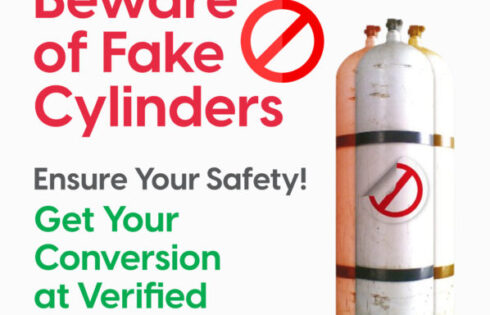Public Safety Warn I IMG: SON Advises Against Use of Uncertified CNG Gas Cylinders
Following the disturbing news emanating from the unfortunate CNG Cylinder explosion at the NIPCO CNG Refueling Station in Benin City, Edo State, the Standards Organisation of Nigeria (SON) is calling on all to heed the warning against the use of substandard and uncertified CNG Gas cylinders.
As the Organization commiserates with those affected by the incident; it is pertinent to note that preliminary investigations has revealed the cylinder used to convert the vehicle differs and does not comply with the CNG Standards approved by the Organisation.
The Organisation has robust and effective regulatory measures in place to ensure that all CNG equipment and conversion kits conform to approved standards before being certified for public use. The conformity assessment schemes are designed to prevent the import, manufacturing, and use of substandard products.
In addition, SON, in collaboration with the Presidential Initiatives on CNG and other relevant government bodies, is finalizing the Nigerian Gas Vehicle Monitoring System (NGVMS) – a platform that will provide centralized monitoring and surveillance of CNG systems to ensure that only vehicles equipped with certified conversion kits can access gas at retail outlets.
The NGVMS will also offer a database of approved CNG equipment and suppliers which will go a long way in preventing the substandard installations and further mitigating the associated risks.
This initiative reassures the public that CNG safety is a top priority and reaffirms SON’S commitment to ensuring the safe use of CNG in Nigeria. It also urges all stakeholders to prioritize safety and recognize that LPG and other gas cylinders are not suitable for CNG containment.
It is therefore imperative to highlight the structural differences between the LPG and the CNG Cylinders which are crucial to ensuring and maintaining safety under the high pressure associated with CNG Vehicles.
The key differences include:
PRESSURE CAPACITY: The LPG cylinders with a working pressure of 7 bar can withstand a test pressure of up to 30 bar of gas while the CNG cylinders are designed for much higher pressures with working pressure of up to 200 bar to withstand a test pressure of 300 bar and above.
CONSTRUCTION: The LPG cylinders can have welded joints/seams while the CNG cylinders are seamless and do not have weld joints.
CNG vehicle users are strongly advised to install only SON-certified cylinders in their vehicles, as the use of uncertified cylinders presents serious safety risks which should not be overlooked.
Furthermore, SON charges all CNG refueling stations to undertake on-the-spot inspections to ascertain vehicles are equipped with approved conversion kits with required label identifying the conversion Centre.
The Standards Organisation of Nigeria (SON) is unwavering in its commitment to the development of CNG products’ standards and their certification to meet safety requirements thereby enhancing safety in the CNG conversion process and strengthening the regulatory framework.








